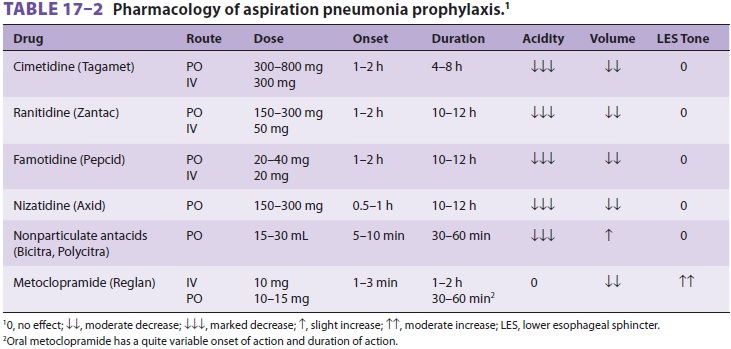Chapter: Clinical Anesthesiology: Clinical Pharmacology: Adjuncts to Anesthesia
Aspiration: H2-Receptor Antagonists
H2-Receptor Antagonists
Mechanism of Action
H2-Receptor
antagonists include cimetidine, famoti-dine, nizatidine, and ranitidine (Table 17–2).
These agents competitively inhibit histamine binding to H2 receptors, thereby reducing gastric acid output and
raising gastric pH.

Clinical Uses
All H2-receptor
antagonists are equally effective in the treatment of peptic duodenal and
gastric ulcers, hypersecretory states (Zollinger–Ellison syndrome), and
gastroesophageal reflux disease (GERD). Intravenous preparations are also used
to prevent stress ulceration in critically ill patients. Duodenal and gastric
ulcers are usually associated with Helicobacter
pylori infection, which is treated withcombinations of bismuth,
tetracycline, and metronidazole. By decreasing gastric fluid volume and
hydrogen ion content, H2 blockers reduce theperioperative risk of
aspiration pneumonia. These drugs affect the pH of only those gastric
secretions that occur after their administration.
The combination of H1- and H2-receptor antagonists provides some protection against drug-induced allergic reactions (eg, intravenous radio-contrast, chymopapain injection for lumbar disk disease, protamine, vital blue dyes used for sentinel node biopsy). Although pretreatment with these agents does not reduce histamine release, it may decrease subsequent hypotension.
Side Effects
Rapid intravenous injection of
cimetidine or raniti-dine has been rarely associated with hypotension,
bradycardia, arrhythmias, and cardiac arrest. These adverse cardiovascular
effects have been reported following the administration of cimetidine to
criti-cally ill patients. In contrast, famotidine can be safely injected
intravenously over a 2-min period. H2-Receptor
antagonists change the gastric flora by virtue of their pH effects.
Complications of long-term cimetidine therapy include hepatotoxicity (ele-vated
serum transaminases), interstitial nephritis (elevated serum creatinine),
granulocytopenia, and thrombocytopenia. Cimetidine also binds to andro-gen receptors,
occasionally causing gynecomastia and impotence. Finally, cimetidine has been
asso-ciated with changes in mental status ranging from lethargy and
hallucinations to seizures, particularly in elderly patients. In contrast,
ranitidine, nizatidine, and famotidine do not affect androgen receptors and
penetrate the blood–brain barrier poorly.
Dosage
As a premedication to reduce the risk of
aspira-tion pneumonia, H2-receptor antagonists should be
administered at bedtime and again at least 2 h before surgery (Table 17–2).
Because all four drugs are eliminated primarily by the kidneys, the dose should
be reduced in patients with significant renal dysfunction.
Drug Interactions
Cimetidine may reduce hepatic blood flow
and binds to the cytochrome P-450 mixed-function oxidases. These effects slow
the metabolism of a multitude of drugs, including lidocaine, propranolol,
diazepam, theophylline, phenobarbital, warfarin, and phenyt-oin. Ranitidine is
a weak inhibitor of the cytochrome P-450 system, and no significant drug
interactions have been demonstrated. Famotidine and nizatidine do not appear to
affect the cytochrome P-450 system.
Related Topics